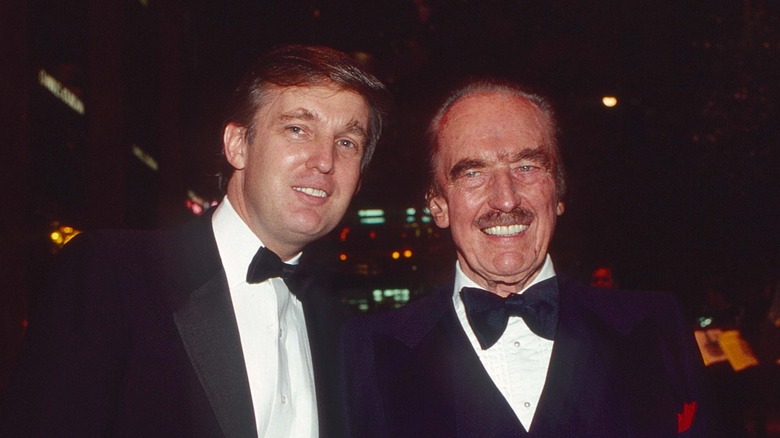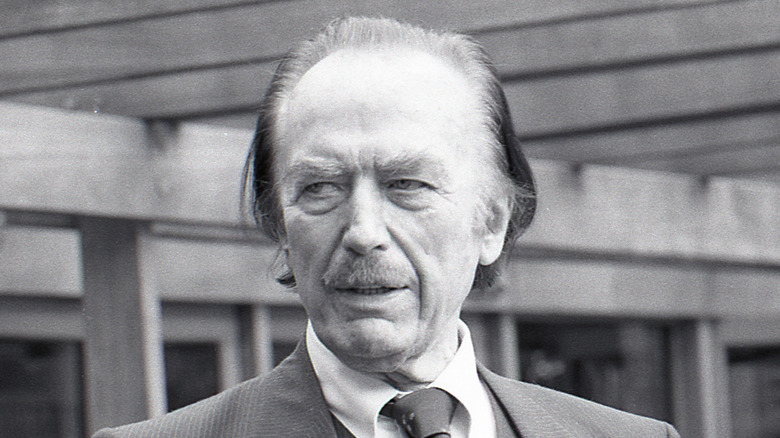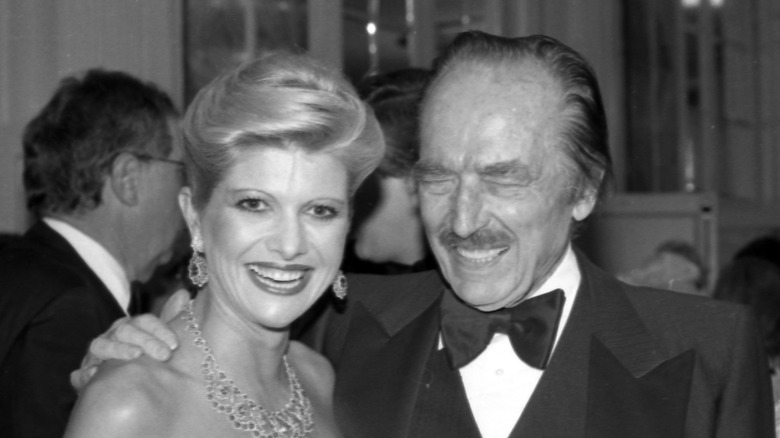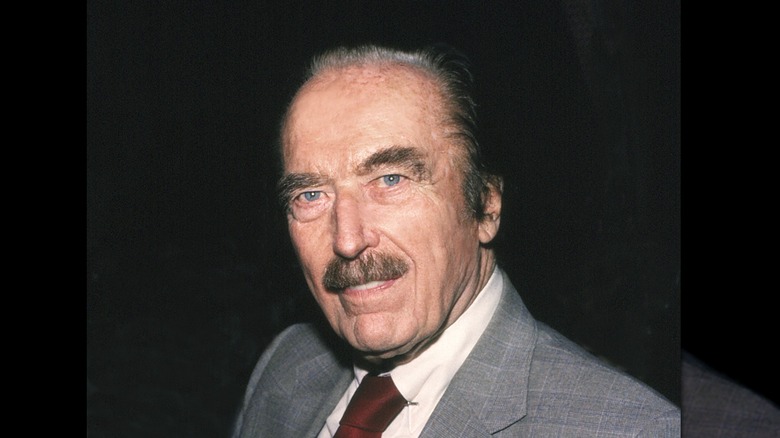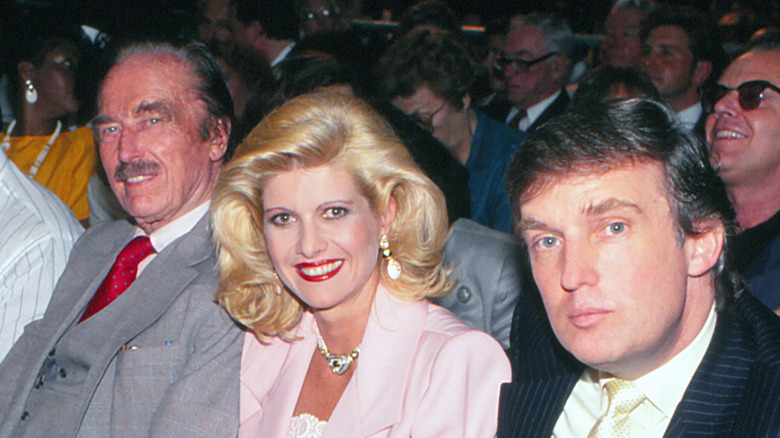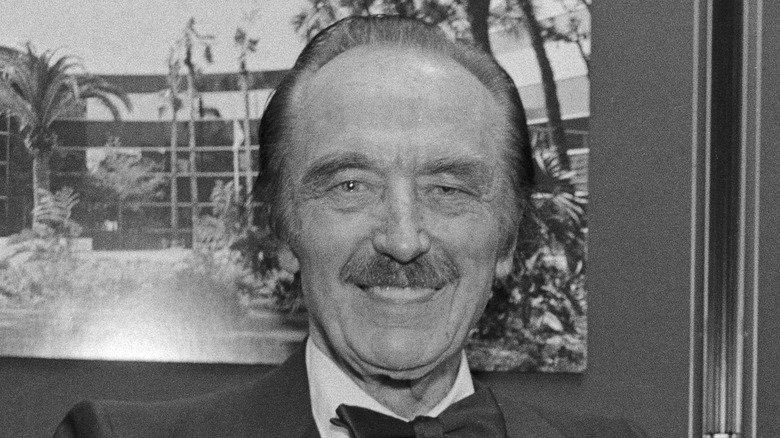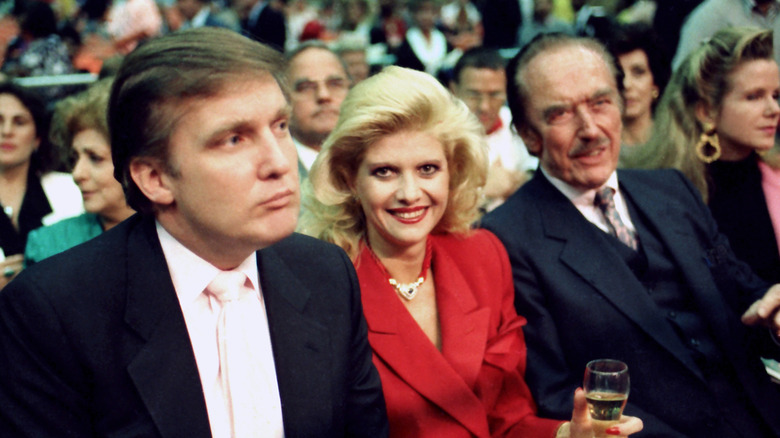Disturbing Claims About Donald Trump's Dad, Fred
The saying goes, "Like father, like son," and it rings true for Donald Trump and his dear old dad. The president's late father, Fred Trump, achieved great success in real estate and building developments during his life but was known for his brash nature and crass business practices. He was also involved in many controversies, and there's no shortage of disturbing claims that have risen about him. Fred undoubtedly passed some traits onto his son, who is either the most pitiful president that ever lived or the most revered — depending on who you ask.
The elder Trump didn't always have a sterling reputation, as he was known to engage in shady business dealings, like filing dodgy tax returns to generate more profit. Donald may have one-upped his father by taking the title of the first-ever convicted president, but Fred was the original corner-cutter. When it came to minimizing costs and maximizing profit, he was an expert. The question remains, however, as to how legal his operations were.
It wasn't just how Fred ran his businesses that drew attention either. He has long been accused of racial discrimination and abusive behaviors, with some claims being brought forth by his close relatives. Decades after he died in 1999, he continues to draw criticism for how he lived his life and how much of it shaped Donald and his presidency. Here's a look at the most shocking claims about Donald Trump's dad, Fred.
Fred Trump was allegedly arrested at a KKK rally
Former head of "The Apprentice" Donald Trump isn't the only one in his family with an arrest record. Fred has had a few run-ins with the law himself and was first arrested in 1927.
The incident occurred during a Ku Klux Klan rally that got out of hand in Queens, New York, where 1,000 Klansmen had gathered to protest the deaths of two Italian fascists. According to a Daily Star report released at the time (via The Washington Post), the real estate mogul, who was 21 at the time, was charged with "refusing to disperse from a parade when ordered to do so." It is unknown, however, whether Fred was participating in the rally or a passerby at the wrong place at the wrong time.
The arrest remained hidden for years, as the New York police don't maintain arrest documents dated that far back. Washington Post reporter Philip Bump eventually confirmed the news after matching Fred's former address with a 1930 census report. Still, Donald remained unconvinced. "He was never arrested. He has nothing to do with this," the president told the Daily Mail. "This never happened. This is nonsense and it never happened."
He was arrested again 50 years later
Fred Trump's second arrest occurred 50 years later when he was managing several rental properties. In 1976, he was hit with five citations for not adhering to housing code violations — which was reported on by The Washington Post at the time — in a 504-unit apartment complex he owned in Seat Pleasant, Maryland. As noted by the report (via The Washington Post), "Trump was cited for the violations that include broken windows, 'rotted' (defective) rain gutters, and the failure to install fire extinguishers."
The real estate mogul had been warned after he had failed inspection nine months prior. "We probably haven't issued four arrest warrants in the past five years," said inspector Joseph Healey to the publication at the time. "All we want is compliance." The County Housing Department's chief inspector, C.H. Bennett, gave Fred ample notice on the phone several times before signing off on the arrest warrant and putting him in cuffs. Fred was released from jail shortly after posting his $1,000 bail.
Fred was investigated for shady business practices
Fred Trump built a real estate empire so vast that he was often referred to as "the Henry Ford of the home-building industry." He managed to amass an over $300 million fortune before his death, but his wealth raised plenty of question marks. Naturally, New York officials eventually came knocking and began investigating the businessman's abundant assets.
Trump's sweeping real estate portfolio included around 27,000 apartments and homes throughout his career within New York City. But in 1966, he was turning heads for the wrong reasons when the state's Investigation Commission took a closer look into his income. The agency investigated potential windfall profiteering, which refers to a person receiving "a sudden unexpected profit," according to Nasdaq. Officials speculated the real estate tycoon exaggerated his construction costs to obtain grants from the government, but taking the leftover money and putting it into his many other real estate properties. He was never arrested, but questions about the Trump family's finances persisted.
In a 2018 special investigation by The New York Times, it was reported that Fred and his wife, Mary Trump, transferred over $1 billion to their children during their lives, of which only around 5% was taxed. With the help of their son, Donald, they allegedly avoided $500 million in inheritance fees by undervaluing their properties in tax returns and funneling money into falsified corporations to avoid gift and inheritance taxes.
He was sued for racial discrimination
Fred Trump has long been accused of having racial bias, and it doesn't just have to do with his arrest at a KKK rally in 1927. Trump Management Inc., which included both Fred and Donald Trump, were sued by the Civil Rights Division of the Justice Department in 1973 for racial discrimination.
The New York City Human Rights Division collected evidence for the case by using undercover renters, with both Black and white individuals approaching Fred's real estate company. One tester, Sheila Morse, alleged that a black man was unfairly turned down for a rental by the Trump family. "He met with the superintendent, and the superintendent said, 'I'm very sorry, but the apartment is rented — it's gone,'" Morse claimed to NPR. "So the gentlemen said to him, 'Well, why is the sign out? I still see a sign that says apartment for rent.' And the superintendent said, 'Oh, I guess I forgot to take it down.'" But Morse, who is white, allegedly had a far different experience. "They greeted me with open arms and showed me every aspect of the apartment."
Based on the evidence, the Civil Rights Division officials accused the Trump family of violating the Fair Housing Act of 1968. The Justice Department sued the company, with the defendants countersuing the department for $100 million for false accusations. The parties settled the case out of court two years later, with the judge throwing out the Trumps' claims against the Justice Department.
His granddaughter called him a 'high-functioning sociopath'
Fred Trump's grandchildren don't exactly have the best impression of the businessman. His granddaughter, Mary, published her memoir, "Too Much and Never Enough: How My Family Created the World's Most Dangerous Man" in 2020, making shocking allegations about Fred and how his behavior influenced Donald.
With information given to her by her aunt, Maryanne Trump Barry, Mary claimed that her grandfather was a "high-functioning sociopath." She accused him of racist, sexist, xenophobic, and sexist behavior in the book, as well as neglecting his son in his most crucial years. "Having been abandoned by his mother for at least a year, and having his father fail not only to meet his needs but to make him feel safe or loved, valued or mirrored, Donald suffered deprivations that would scar him for life," she wrote (via The Guardian).
Mary also alleged in the memoir that Fred gave Donald a distorted view of emotions, teaching his son to run at the first sign of weakness. "Softness was unthinkable," she wrote (via BBC) of her grandfather, claiming he often mocked his children for any mistake. "By limiting Donald's access to his own feelings and rendering many of them unacceptable, Fred perverted his son's perception of the world and damaged his ability to live in it," Mary shared.
Fred reportedly 'degraded' his children
Mary Trump further accused her grandfather of being unfair to his children, claiming that he refused to support his eldest son and Mary's father, Fred "Freddy" Trump Jr.'s, dreams of becoming a commercial airline pilot. His little brother, Donald, took over the family business instead, leaving him in a downward spiral. "Freddy simply wasn't who [Fred] wanted him to be," Mary wrote in the book (via The Washington Post). "Fred dismantled his oldest son by devaluing and degrading every aspect of his personality and his natural abilities until all that was left was self-recrimination and a desperate need to please a man who had no use for him."
Donald, who's seven years younger than his brother, grew up with a tainted view of Freddy after his father had ultimately drawn the line in the sand. "The lesson he learned, at its simplest, was that it was wrong to be like Freddy: Fred didn't respect his oldest son, so neither would Donald," wrote Mary (via BBC). Fred Sr. reportedly removed Freddy from his will and isolated him from his family while he suffered from alcoholism and heart problems. Fred's eldest son eventually died at just 42 years old in 1981 after years of struggling with his addiction left him in dire states.
If you or anyone you know needs help with addiction issues, help is available. Visit the Substance Abuse and Mental Health Services Administration website or contact SAMHSA's National Helpline at 1-800-662-HELP (4357).

